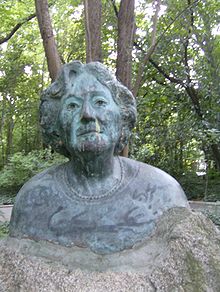Rosa Chacel
Rosa Chacel | |
|---|---|
 Bust of Chacel in Valladolid (1988), by Francisco Baron (1931-2006) | |
| Born | Rosa Clotilde Chacel Arimón 3 June 1898 |
| Died | 27 July 1994 (aged 96) Madrid, Spain |
Rosa Clotilde Chacel Arimón (June 3, 1898 – July 27, 1994) was a famous and sometimes controversial
Early life
Chacel was born in
By 1909, Chacel's mother enlisted her at Madrid's Escuela de artes y oficios to study
Chacel then went on to become a regular at the
Chacel, nevertheless, went on championing feminism as a new way to live for modern women, and, in 1921, she married a famous painter of the time,
In 1930, Chacel wrote her first
This new, political problem, forced Chacel to move multiple times with her son, and she lived in
Exile
The next years Chacel lived in relative obscurity: a well-known writer but one who had made no new projects in years. This changed in 1959, however, when she won a
Return to Spain

In 1977, her husband of 56 years died, and Chacel, who was a very frequent flyer between Madrid and Rio de Janeiro, decided to stay in Spain for good. She used her newly found status as a widow to try to rescue some of her old works and to write more novels.
Death and legacy
She died peacefully in Madrid on Sunday, August 7, 1994, aged 96.[6]
The Spanish national
Awards and honors
- Guggenheim Fellowship
- Chacel was granted a Doctor Honoris Causadegree by the University of Valladolid (1989).
- Towards the end of her life, she won various prestigious awards, some of whom were given by King Juan Carlos.
- In 1987, she received the "National Award of the Letters (writing)", an award reserved for the very best writers of Spain.
- In 1990, she received the "Premio Castilla y Leon de las letras" ("Castilla y Leon award of the letters"), an award whose winners are chosen by the King.
Notes
- ^ Global Britannica
- ISBN 978-0-313-28731-2.
- ^ New York Times, Eric Pace, "Rosa Chacel, 96, A Spanish Novelist Exiled for 36 Years", August 2, 1994
- ^ "Rosa Chacel". John Simon Guggenheim Memorial Foundation.
- ^ (es) hispanicexile.bham.ac.uk Archived 2012-03-15 at the Wayback Machine
- ^ (fr)Le Monde, Obituary, 29.07.1994
- ^ El Pais, Obituary, 28 Jul. 1994
- ^ Independent.co.uk, James Kirkup, Friday 29 July 1994,Obituary
Books and newspapers
- Rosa Chacel: premio nacional de las letras españolas, 1987 (in Spanish). Anthropos Editorial. 1990. ISBN 9788476582169..
- Jueves (1994-07-28). "Muere Rosa Chacel, maestra de la aventura íntima". El País (in Spanish)..
- Staff Le Monde (1994-07-29). "Mort de l'écrivain espagnol Rosa Chacel". Le Monde (in French)..
- Kirkup, James (1994-07-29). "Obituary: Rosa Chacel". The Independent..
- Page, Eric (1994-08-02). "Rosa Chacel, 96, A Spanish Novelist Exiled for 36 Years". The New York Times..
- Santa, Àngel; Didier, Béatrice; Fouque, Antoinette; Calle-Gruber, Mireille (2013). "Chacel, Rosa (Valladolid 1898 - Madrid 1994)". Le dictionnaire universel des créatrices (in French). Éditions des femmes. p. 818..
